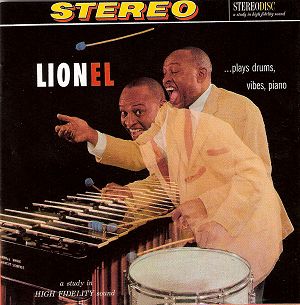1. Just One of Those Things
2. Lazy Thoughts
3. The Man I Love
4. One Step from Heaven
5. Darn That Dream
6. Stardust
7. Tracking Problem
8. Lullaby of Birdland
9. Blues for Stephen
10. And the Angels Sing
11. Our Love is Here To Stay
12. I Know That You Know
13. Skylark
14. Day By Day
15. Speak Low
16. My Foolish Heart
17. Poor Butterfly
18. Blue Moon
19. I Can't Get Started
Lionel Hampton - Vibes, piano, drums, xylophone,
celeste, vocals
Bobby Plater - Flute, alto sax, tenor sax,
clarinet (tracks 1-12)
Oscar Dennard - Piano (tracks 1-12)
Billy Mackel - Guitar (tracks 1-12, 18, 19)
Julius Brown - Bass (tracks 1-12)
Wilbert "G. T." Hogan - Drums (tracks 1-12)
Eddie Bert, Dick Hixson, Sonny Russo, Bobby
Byrne - Trombones (tracks 13-17)
Tommy Flanagan - Piano (tracks 13-19)
Skeeter Best - Guitar (tracks 13-17)
George Duvivier - Bass (tracks 13-19)
Osie Johnson - Drums (tracks 13-17)
Elvin Jones - Drums (tracks 18, 19)
Lionel
Hampton was versatile, as this album title
suggests. In fact he was even more versatile
than the title conveys, as he plays xylophone
and celeste on the last two tunes, as well
as doing some singing. In their commendable
habit of squeezing as many tracks as possible
onto a CD, Lonehill Records gives us the complete
Lionel...Plays Drums, Vibes, Piano
album from 1957 as well as seven tracks from
the Silver Vibes session recorded in
1960.
The
first 12 tracks put Lionel with a small group
that included some of the regulars from his
big band - notably multi-instrumentalist Bobby
Plater and Lionel's long-time guitar colleague
Billy Mackel. Plater demonstrates his versatility
on four different instruments, and it is good
to hear some solos from Mackel, who was seldom
featured so prominently with the big band.
But the main spotlight is on Lionel Hampton,
who sometimes sounds so casual as to be careless.
The opening Just One of Those Things includes
several wrong notes on vibes but Hamp doesn't
seem to care - and he still swings as infectiously
as he always has. Lionel's ability to swing
was one of his main assets, as was the fact
that he seemed to keep the shape of a tune
in his head, so that listeners can always
hear a tune's structure behind one of his
solos.
And
what solos he could play! Stardust often
appeared in his repertoire, and the
version here is different from all the others
he played - taken at a very leisurely tempo,
which naturally Lionel doubles up. Of course,
Hamp's solo contains the familiar quotations
(for example, from Pretty Baby) but
there are also plenty of unexpected twists.
Tracking Problem and I Know That
You Know illustrate his dexterity on drums,
while Blues for Stephen exhibits his
two-fingered approach to the piano alongside
his predilection for quoting other tunes (here
including Chicago and the Wedding March).
And the Angels Sing has a nonchalant
Hampton vocal.
Tracks
13 to 17 feature a trombone quartet backing
Lionel's rhapsodic vibes in predominantly
slow ballads. It would be nice to know who
wrote the sensitive arrangements. The two
final tracks put Hamp with a smaller group
and give us the opportunity to hear him playing
the xylophone and celeste, two instruments
he is not noted for, although he plays both
of them without any difficulty.
As
someone who snaps up every Lionel Hampton
recording eagerly, I wouldn't say this was
one of his very best albums, but it is full
of the sort of varied, carefree, swinging
jazz that Lionel seemed to produce naturally.
Tony
Augarde
